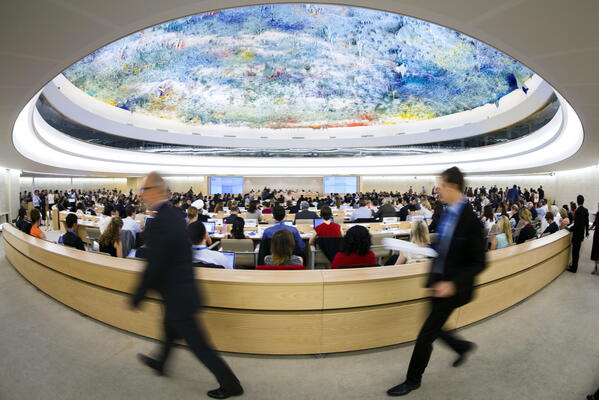How does Germany protect human rights?

How are human rights enshrined in the German constitution, the Basic Law?
“Human dignity shall be inviolable. To respect and protect it shall be the duty of all state authority.” This is the clear duty imposed by Article 1 of the Basic Law The Basic Law The Basic Law determines that Germany is a constitutional state: All state authorities are subject to judicial control. Section 1 of the Basic Law is of particular relevance. It stipulates that respect for human dignity is the most important aspect of the constitution: “Human dignity shall be… Read more › , in which Germany has committed itself to “inviolable and inalienable human rights Human rights The respect and strengthening of human rights worldwide are a cornerstone of German Federal Government policy. Together with its EU partners it is committed to protecting and continually advancing human rights standards throughout the world. This occurs in close collaboration with the institutions… Read more › ” as “the basis of every community, of peace and of justice in the world.”
What role do human rights play in Germany's international relations?
The protection and strengthening of human rights play a particular role in the context of foreign policy and international relations, as systematic human rights Human rights The respect and strengthening of human rights worldwide are a cornerstone of German Federal Government policy. Together with its EU partners it is committed to protecting and continually advancing human rights standards throughout the world. This occurs in close collaboration with the institutions… Read more › violations are often the first thing that happens in conflicts and crises. As a member of the Council of Europe, Germany works with partners in the European Union European Union In 1957, Germany was one of the six founding members of today’s EU, along with France, Italy, Belgium, the Netherlands and Luxembourg. The EU is currently made up of 27 states; the euro is the official currency in 20 of them. For Germany, European integration forms the basis for peace, security and… Read more › and the United Nations United Nations The United Nations (UN) has a key role to play in the international system. Germany has been a UN member since 1973. Since joining, Germany has taken on more and more responsibility and is now one of the largest donors and supporters of the United Nations. For example, Germany is the second largest… Read more › to protect and improve human rights standards around the world.
How is Germany involved in promoting human rights at the United Nations?
Germany is a signatory to all the major UN human rights Human rights The respect and strengthening of human rights worldwide are a cornerstone of German Federal Government policy. Together with its EU partners it is committed to protecting and continually advancing human rights standards throughout the world. This occurs in close collaboration with the institutions… Read more › conventions and their supplementary protocols. These conventions allowed states to create a comprehensive system of treaties to protect human rights, based on the Charter of the United Nations United Nations The United Nations (UN) has a key role to play in the international system. Germany has been a UN member since 1973. Since joining, Germany has taken on more and more responsibility and is now one of the largest donors and supporters of the United Nations. For example, Germany is the second largest… Read more › and the 1948 Universal Declaration of Human Rights Human rights The respect and strengthening of human rights worldwide are a cornerstone of German Federal Government policy. Together with its EU partners it is committed to protecting and continually advancing human rights standards throughout the world. This occurs in close collaboration with the institutions… Read more › . Germany has ratified many legally binding conventions, including the Covenant on Civil and Political Rights, the Covenant on Economic, Social and Cultural Rights, the International Convention on the Elimination of All Forms of Racial Discrimination, the Convention on the Elimination of All Forms of Discrimination against Women, the Convention Against Torture, the Convention on the Rights of the Child, the Convention on the Rights of Persons with Disabilities, and the Convention for the Protection of All Persons from Enforced Disappearance.
German law enshrines the rights and obligations of the state that are defined in the treaties. At the same time, the Federal Government Federal Government The Federal Government and cabinet is made up of the Federal Chancellor and the Federal Ministers. While the Chancellor holds the power to issue directives, the ministers have departmental powers, meaning that they independently run their respective ministries in the framework of those directives… Read more › 's activities around the world include promoting protection from discrimination and racism. It also campaigns against the death penalty and calls for greater political participation and the protection of rights. Germany defends freedoms of religion and conscience, combats human trafficking and pushes for the enforcement of rights to habitation, clean drinking water and sanitation, for example. The German government is also committed to upholding the rights of lesbian, gay, bisexual, trans- and intergender and other queer people (LGBTIQ+). Another current priority of German rights policy is protecting human rights in the digital age. Within the United Nations, the Federal Government is actively supporting the work of the UN Human Rights Council and campaigning to further strengthen the High Commissioner for Human Rights.
How does Germany promote human rights in the Council of Europe?
When it comes to protecting and promoting human rights Human rights The respect and strengthening of human rights worldwide are a cornerstone of German Federal Government policy. Together with its EU partners it is committed to protecting and continually advancing human rights standards throughout the world. This occurs in close collaboration with the institutions… Read more › , the rule of law and democracy across the whole of Europe, Germany is one of the most active members of the Council of Europe. There are 46 members of the Council, including the 27 members of the European Union European Union In 1957, Germany was one of the six founding members of today’s EU, along with France, Italy, Belgium, the Netherlands and Luxembourg. The EU is currently made up of 27 states; the euro is the official currency in 20 of them. For Germany, European integration forms the basis for peace, security and… Read more › . Through groundbreaking agreements and above all the European Convention on Human Rights Human rights The respect and strengthening of human rights worldwide are a cornerstone of German Federal Government policy. Together with its EU partners it is committed to protecting and continually advancing human rights standards throughout the world. This occurs in close collaboration with the institutions… Read more › , the Council of Europe is helping develop a common European legal space. It also monitors observance of binding common standards and values in the continent of Europe. The European Court of Human Rights (ECHR), which is based in Strasbourg in France, is a core institution by which the Council can enforce these rights. All citizens of member states can appeal to the ECHR against violations of rights protected by the Human Rights Convention. Germany strongly advocates for all state parties to implement the court’s decisions. The International Court of Justice (ICJ) in the Hague in the Netherlands is responsible for punishing serious crimes under international law such as war crimes, crimes against humanity and genocide. Germany supports universal recognition of the ICJ.


